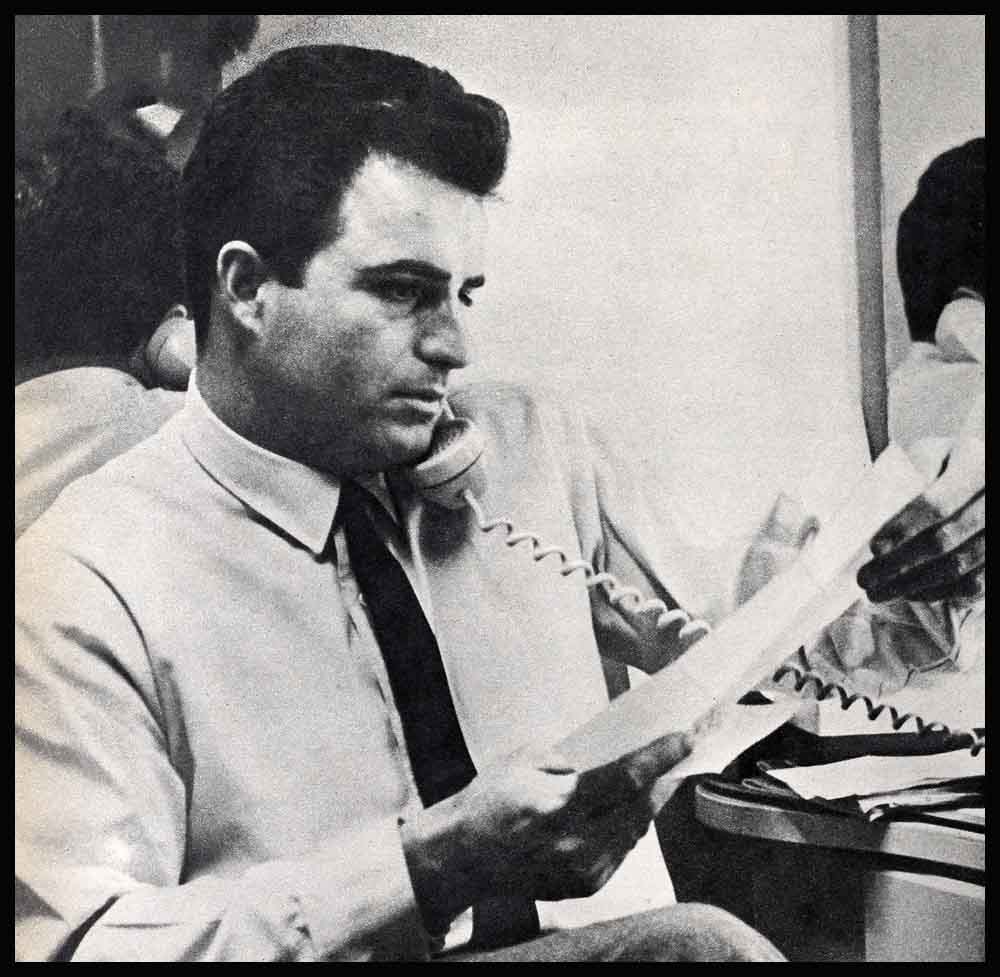
Is Vince Edward’s Breaking His Mother’s Heart?
The letter was written on the very swank stationery of the Mayfair Hotel at Berkeley Square, London. It read, “Dear Mom, having a good time in London. The picture is going very well. I leave for Naples, Italy, next week. The weather out here is wonderful but I still love the good old U.S.A. I expect to be in New York about September 16th. Hoping everything is fine with all the family. Miss you all. I will call and let you know when I arrive. See you soon.”
It closed, “Your loving son,” and the signature was “Vince.”
But Mrs. Julie Zoine didn’t look happy. Her eyes were sad. She wasn’t the usual carefree, bubbling-with-enthusiasm person I’ve known her to be.
“That’s typical of the letters my son writes,” she said. “Very short and very sweet. I have to read between the lines to find any hidden messages.”
There aren’t many things that bother Mrs. Zoine, but talking about the letter her famous son Vince Edwards wrote to her from London seemed to inflict both sadness and annoyance upon the actor’s sixty-eight-year-old mother. Brave woman that she is, she tried to hide her feelings. But not successfully.
“Don’t hold that against Vince,” Mama Julie told me, half-pleadingly. “Vince is a very good son, but . .
Her voice drifted. It was the “but” which carried significance and which set up the springboard for this story.
“You see,” Mrs. Zoine said reminiscently, “Vinnie used to be a real homebody until three years ago. He wrote regularly, phoned frequently and visited home at least once a year.”
Home is Brooklyn, U.S.A., where Vince was born and raised before he went off to seek fame and fortune in Hollywood. It took nearly a dozen years for Vince to find it. That happy day in his life came only three years ago when he was “discovered” for the role of television’s sensational “Ben Casey” series. Until then he had knocked around in an endless procession of insignificant, unrewarding roles in grade B movies—a virtual unknown.
“I suppose when things were not so good for Vinnie he had more time to write, more time to come home and see his family,” Mama Julie went on. “But now we never see him. We’ve only laid eyes on him twice in the last three years.”
The first time was summer of 1962, when Vinnie visited twin brother Bob’s house in Westbury, Long Island. The second visit was later that summer when Vince returned from Europe after shooting “The Victors” for movie producer Carl Foreman in England and Italy. Vince’s only communication home had been the letter from London to his mother.
Dwelling with dismay on Vince’s infrequent visits home, Mama Julie said “When he did come home, those two times, we hardly got to see him. At least I never was able to see him alone for any length of time.
“On his first visit to Westbury there was a big family reunion and, naturally everyone—all his brothers and sisters nieces and nephews and friends—were around Vinnie every minute of the time I’m not complaining, mind you, but after all I would have loved to have spent some time alone with my baby.
“When he came here in September it was an even bigger disappointment. I had been expecting him to fly directly from London to New York and stay with me in Brooklyn. I had made a lot of plans. I wanted him, for one thing, to visit his grandfather. He hasn’t seen his grandfather in more than twelve years.
“But the plans were changed the last minute. Vinnie flew directly to Hollywood over the Polar route. That was very disillusioning for me after I had built up such expectations for his visit.
“He finally came to New York, weeks later. But he disappointed me again by not paying me a visit at home in Brooklyn. I had to settle for an invitation to drop in and see him at the Hampshire House in Manhattan, where he was staying.”
Heartbroken by Vince’s change of plans, Mrs. Zoine reluctantly hied over to Manhattan by subway and went to see her son in his hotel suite. But that wasn’t anything like she had expected, either.
“It was like Grand Central Station,” Mama Julie said, with disappointment in every word. “He was surrounded by all kinds of people—television people, movie representatives, publicity men. You name them, they were there. I didn’t get one moment alone with my son.”
Mama Julie’s patience wore thin after an hour. Sitting through the disconcerting turmoil that attended the presence of so many flunkie’s in Vince’s hotel rooms depressed her terribly. She finally got up, kissed Vince goodbye and left. But before she went, she asked her son for one last favor.
“I’d like you,” she told Vince beseechingly, “to visit me at home. I want to take you over to see your grandfather.”
Vince shook his head.
“It’s impossible, Mom,” he replied flatly. “I’m just too busy. I’ve got a million appointments with TV and movie people, and I’ve only got a few hours before I leave for Hollywood.”
Mama always understands
Mrs. Zoine smiled weakly. “I understand, Vinnie,” she said sadly. “I know how busy you are.”
That was typical of the woman Mama Julie is—understanding. But she does have a heart and feelings. And even though her son is a great success and she is proud of him, there is still that sense of torment that stems from Vince’s reluctance to fulfill his mother’s one big ambition: to come home to Brooklyn.
“It may be a lot to ask of Vinnie, but how much time would it take?” Mama Julie shrugged helplessly. “You see, there are a lot of things I’d like to talk over with Vinnie—things that are private and which are matters only a mother and son can discuss when they are by themselves, without a lot of people around listening and interrupting the conversation.”
Mrs. Zoine is particularly aggrieved over Vince’s failure to visit his grandfather, Carmine Morante. Mr. Morante is Mrs. Zoine’s father. He is ninety-eight years old!
“I wanted Vinnie to see his grandfather so badly,” Mama Julie told me. “After all, how much longer can he live?”
Mama Julie calls her father a “withering flower.”
“Oh, certainly Papa still has all the characteristics he possessed as a young man, but at ninety-eight—well, let’s face it . . .”
“Still and all, Papa has some zest and enthusiasm left for life. He predicts he’ll live to be over a hundred. But his one remaining wish on earth is to see Vinnie.
“ ‘Why don’t you bring the boy over to see me?’ Papa pleads every time I visit him. What can I tell him? ‘He’s very, very busy,’ I say. Papa shakes his head. He smiles. He tells me he understands how it is with television and movie stars.
“Yet it isn’t right. Old as he is, Papa has feelings. When Vinnie was a baby he was Papa’s pride and joy. Papa adored him. Papa would die the happiest man in the world if he could only see Vinnie—just once.”
Vince Edwards’ mother wasn’t asking for the world. She was merely appealing to her famous son for a simple show of love and affection, the same simple love and affection that all the other grandchildren have for Grandfather Morante.
“I’ve done all I could,” Mrs. Zoine said resignedly. “It’s up to Vinnie from here on out. I can’t force him to do it if he doesn’t want to.”
Mrs. Zoine was particularly bitter toward the people who surround Vince in his business. She blames them more than she faults her son for his attitude.
“I have no doubt Vinnie is extremely anxious to visit me, his grandfather and his old neighborhood,” Mama Julie said. “But his agent and the people at ABC are holding him back. They don’t want him to come over. They’re afraid of the crowds that would mob Vinnie. And maybe there are other reasons that I haven’t been able to figure out.
“Yet I think Vinnie is a big enough star to warrant a stand against these people. They’re like molasses in his hair. He can’t move without an okay from them. They’ve even tried to shut me up. But I won’t stand for it. I’m not afraid of them.”
Mrs. Zoine went so far as to say that the people who guide her son’s destinies in the entertainment world don’t dare allow Vinnie to visit Brooklyn for fear of associating him in public print with the poverty and slums that blighted his once-proud Brooklyn neighborhood.
“In a way,” Mrs. Zoine said sadly, “I don’t especially want Vinnie to see what the old neighborhood is like either. There have been so many changes that I don’t think he’d recognize it. He might even be frightened when he sees what’s happened.”
Despite Vince’s refusal to visit his mother and the urgency of seeing his aged grandfather, the big irritation still was his reluctance to write home.
“He doesn’t even write to his brothers or sisters,” Mama Julie told me, recalling an episode involving big brother Joe’s daughter Karen.
“Vinnie had made plans with Joe to have Karen come out to Hollywood for a visit during her high school vacation last Summer. Then the last minute he called and said he was forced to change his own plans, that he had to go to Europe to make ‘The Victors.’
“Vinnie, however, insisted that shouldn’t make any difference to Karen, that she still could come out and stay at his place in Hollywood. But Karen wouldn’t go.
“It’s funny, isn’t it? He invites her out when he knows he isn’t going to be able to go through with the plans. But I suppose that’s show business.”
Mama Julie turned to me with a smile breaking through the sadness of her face.
“I’m a funny person,” she murmured in a thin voice. “I should have nothing to complain about. Vinnie has made me so happy by his success in television and movies. I am such a proud mother. And he has been a very good son in most ways. He always telephones at least once a week. On my birthdays, on holidays, on other special occasions he sends telegrams, candy and flowers.
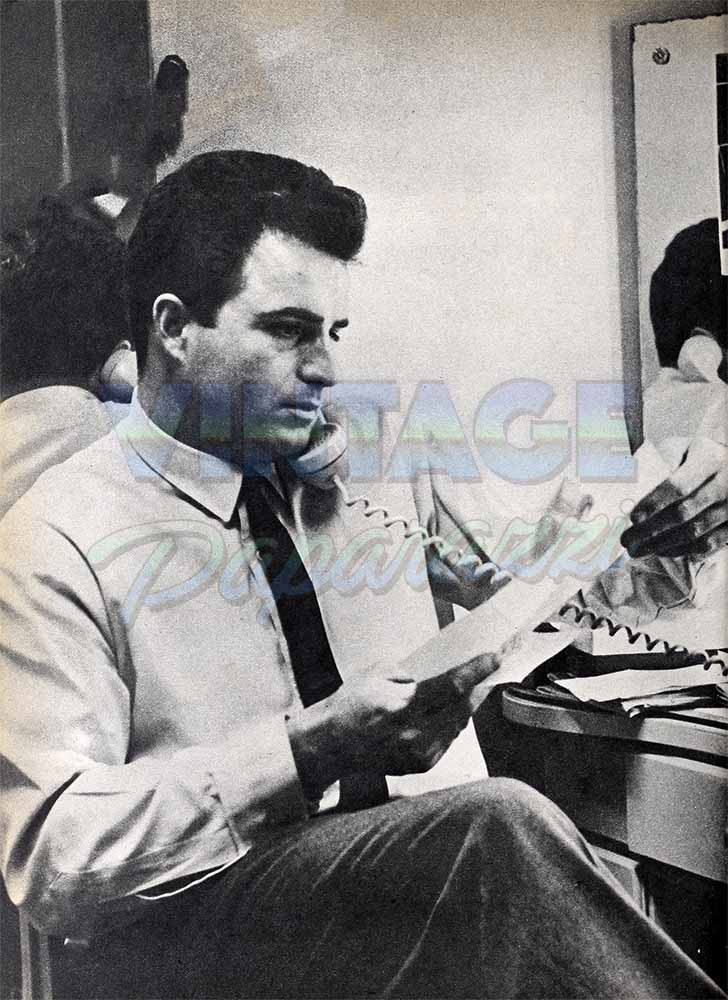
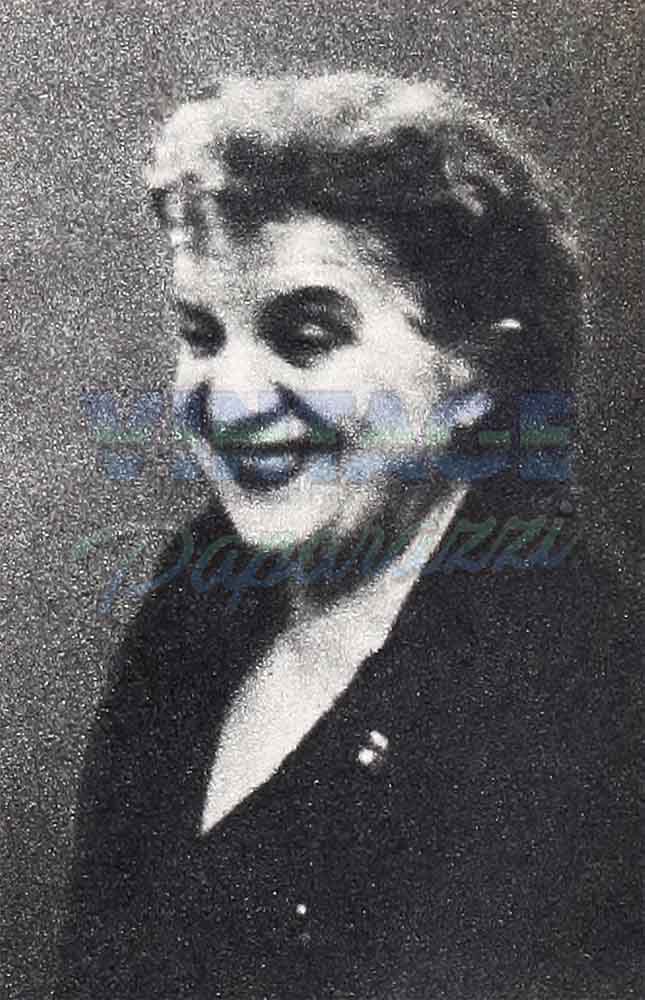
“But I always say to him when he phones, ‘Vinnie, it would be so much easier and less expensive to take paper and pencil and write your poor old mother a nice long letter.’ He laughs and says, ‘Mom, I’d rather hear your voice.’
“I can understand it. He never did like to write. And the phone is so much easier. But a letter is better.
“Vinnie doesn’t understand why I want him to write. He doesn’t know what I feel in my heart. When he calls, I talk to him. I’m thrilled, yes. My heart beats faster because of the excitement of hearing my son’s voice. But then the call ends and I’m alone again. Vince isn’t there. I can’t talk to him anymore and he can’t talk to me. If he wrote, I would have his letter in front of me. When I felt lonely again, when I got the urge to hear my son talk to me, I could take out the letter and read it. That’s the kind of little thing that makes a mother happy.”
Although Vince Edwards’ mother blamed filmland’s functionaries for her son’s new attitudes and ways, she couldn’t help but wonder whether Vince himself had not undergone some drastic changes since hitting the big-time.
“Remember,” Mrs. Zoine said poignantly, “money makes a lot of difference, particularly with a person as impressionable and young as Vinnie. In the old days when he knew nothing but hard times and he was struggling to make something of himself, when he was always broke, he managed one way or another to fulfill his obligations as a son. He wrote often and he came home to see us regularly.
“Now that he is a big success, he seems to have changed. He blames it on the press of business. I’m not so sure. I am almost inclined to think he’s changed. But I blame any change in Vinnie on those people who seem to surround him constantly and run his life for him. I only wish they would leave him alone, let him think things out for himself, make his own decisions. If he could do those things himself, I’m sure Vinnie wouldn’t have any qualms about visiting me and his grandfather in Brooklyn.
“And I’m sure he’d have the time to write home.”
Mrs. Zoine dabbed at her eyes with a handkerchief. She looked very pathetic.
“I’m a little ashamed of myself for talking this way, but I can’t help feeling the way I do. Vinnie is still my baby and I love him so very much. I know he is doing what he has struggled so hard for all these many years. Success, fame, and even fortune are his today. I don’t really have much to complain about. But because it is such a small thing that I’m asking, well. . .
Mama Julie turned and glanced at me with a plaintive smile.
“He’s making the whole world happy,” she said softly. “I really shouldn’t complain. . . .”
Yes, indeed. Vince Edwards is making the whole world happy.
His mother’s turn should come pretty soon.
—CHRYS HARANIS
Vince is in “The Victors,” for Columbia and ABC-TV’s “Ben Casey,” Mon, 10 P.M. EST.
It is a quote. PHOTOPLAY MAGAZINE APRIL 1963


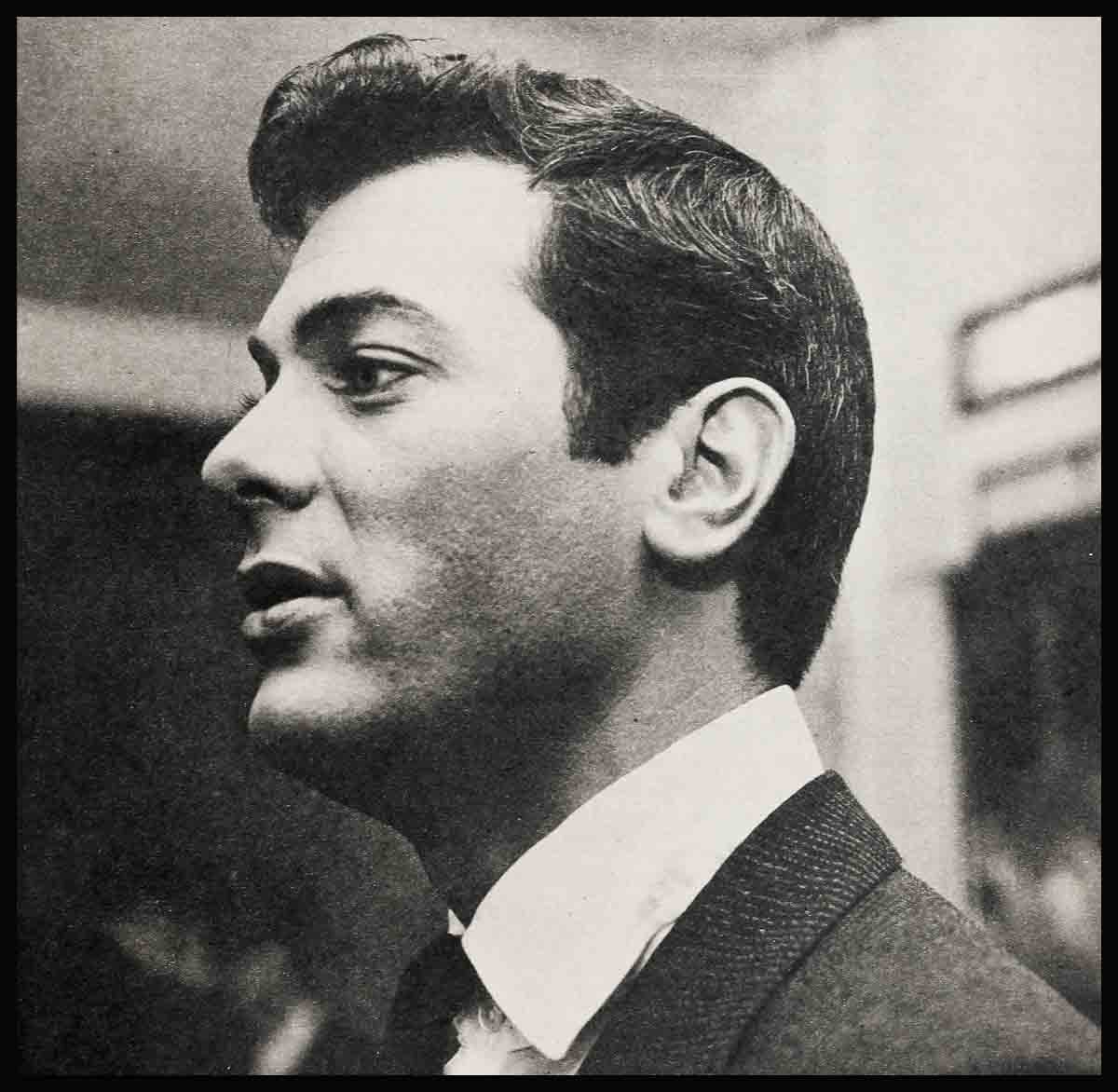
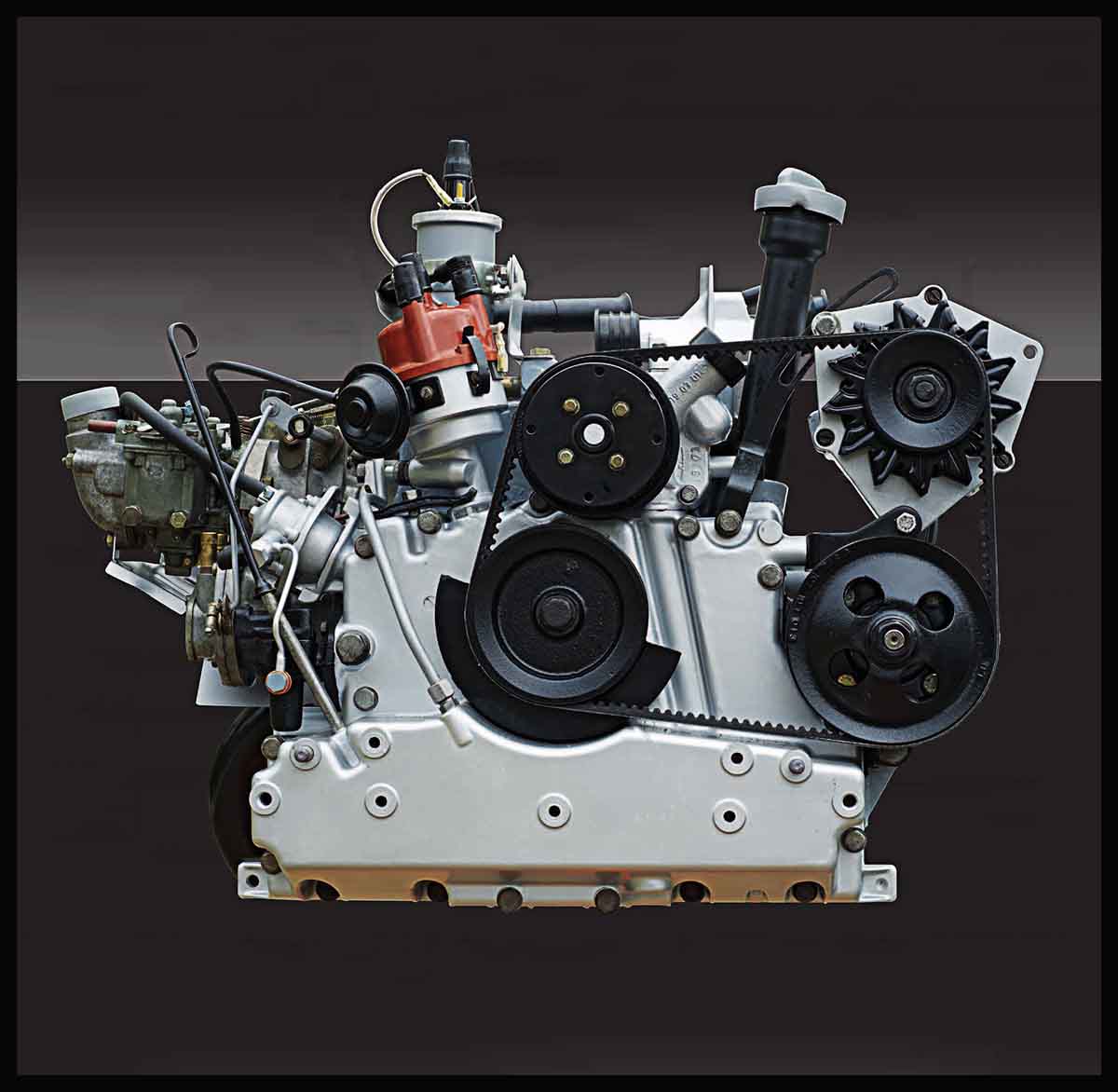
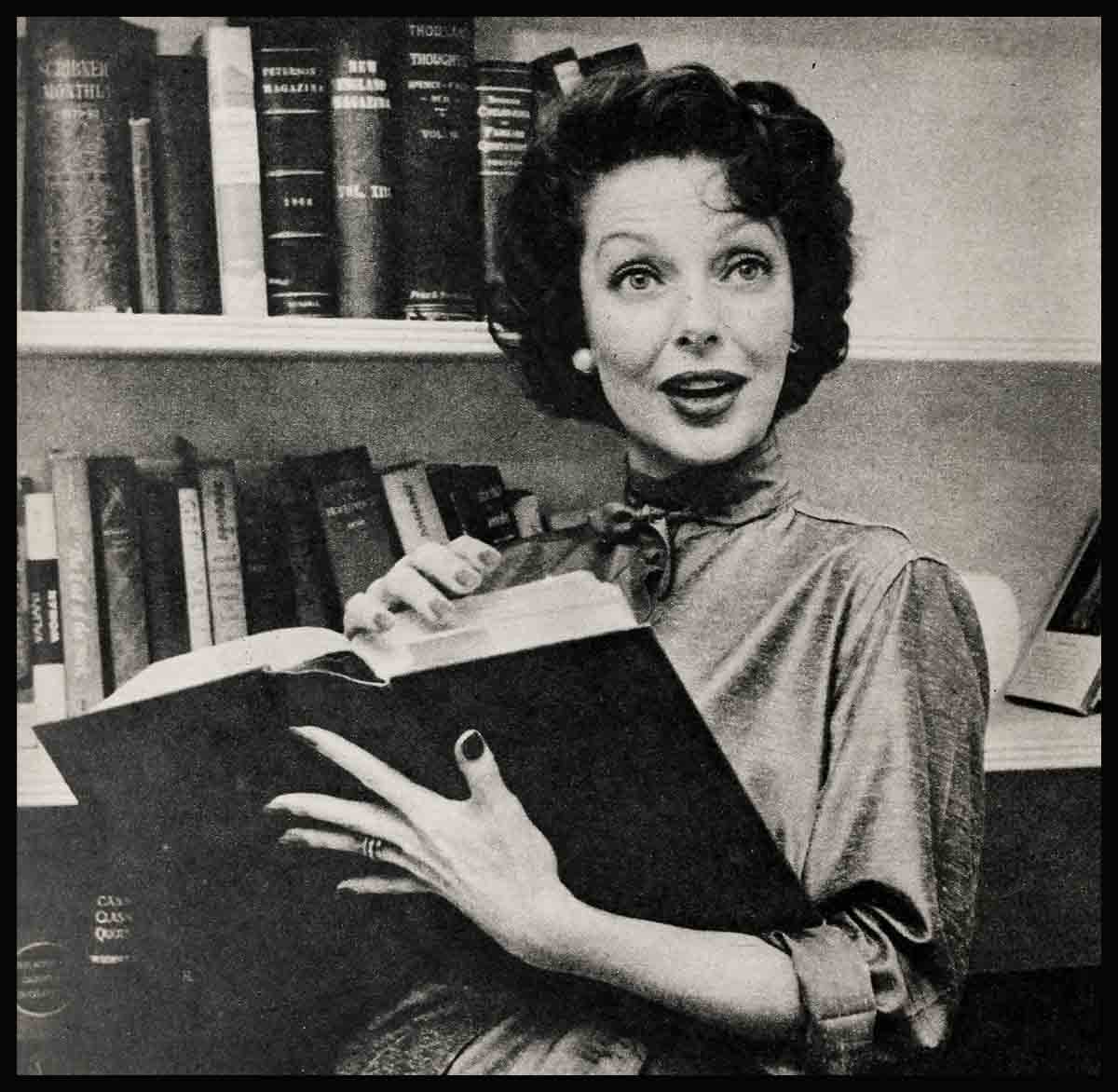
No Comments